Uzbek Language Resources
Below we have highlighted a number of free Uzbek language resources that we have found especially helpful. You can find these and additional resources for Uzbek and our other languages and regions in the Resource Library. If you are a language teacher, student, or resource creator with a resource you would like to see us feature on the website please email us at ceeres@uchicago.edu.
Dictionaries
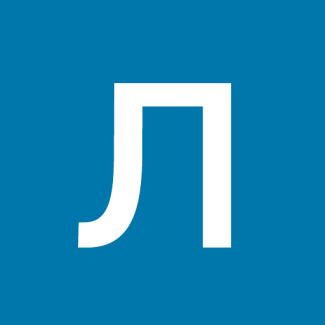
Composite Uzbek-English Dictionary — Seth Knights
This composite dictionary, designed by Seth Knights, combines a number of popular Uzbek-English dictionaries in one place, currently allowing users to search both Indiana's Uzbek-English Dictionary and Hervé Guérin's Uzbek-English Glossary. It also allows users to search in Cyrillic and offers suggested Cyrillic spellings for Uzbek searches in Latin.
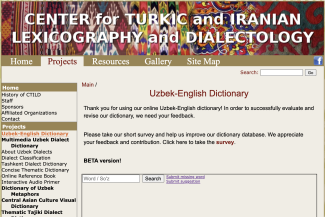
An extensive online Uzbek-English dictionary including definitions in English for numerous converbial forms and verb compounds. The dictionary works best for searches from Uzbek to English and exclusively employs Uzbek written in Latin script.
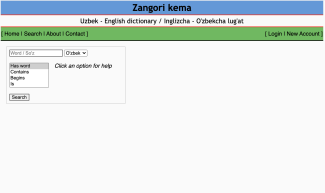
Zangori Kema (Uzbek-English Dictionary) — William Dirks
The dictionary works best for searches from Uzbek to English although the reverse is also possible. It employs Uzbek written in Latin script. Indiana's dictionary is built off of the vocabulary and many of the definitions that were compiled for Zangori Kema.
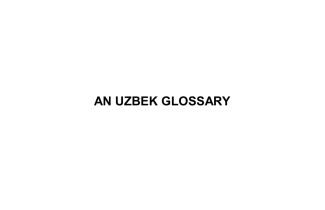
An Uzbek Glossary — Hervé Guérin
A widely cited thematic glossary of Uzbek terms. Compiled by French data scientist Hervé Guérin and previously maintained on Guérin's now defunct website www.uzbek-glossary.com.
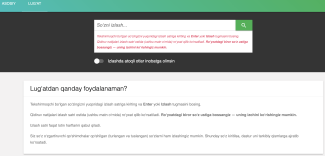
An online Uzbek-Uzbek dictionary with over 1 million entries. Many results are culled directly from Oʻzbek Tilining Izohli Lugʻati, a dictionary compiled by the Uzbek Academy of Sciences. Each entry contains multiple definitions with examples from Uzbek and Chagatai literature. While it does not support Cyrillic script search, the dictionary does allow users to search words with any number of case, tense, participle, or verbal noun suffixes affixed to the stem word and parses them.
Textbooks
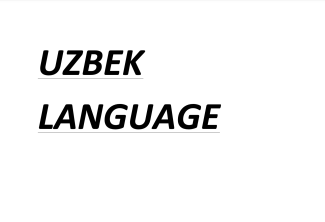
Uzbek Language Materials — Zumrad Ahmedjanova
Brief grammatical sketches of Uzbek, partnered with extensive oral and written exercises using authentic, contemporary Uzbek. Maintained by the Duke Slavic Centers.
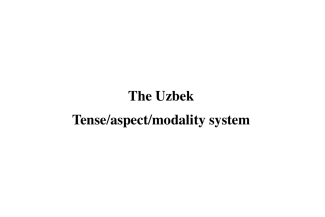
The Uzbek Tense/Aspect/Modality System — Hervé Guérin
A useful explainer of the Uzbek grammar of more complex temporal and conditional expressions with numerous examples in English and Uzbek. Compiled by French data scientist Hervé Guérin and previously maintained on Guérin's widely cited but now defunct website www.uzbek-glossary.com.
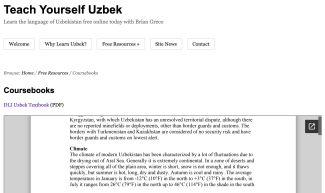
This website compiled by Brian Greco contains a number of pdfs of Uzbek textbooks and dictionaries, including Uzbek: An Elementary Textbook, Uzbek for Foreigners, Colloquial Uzbek: A Mini Course, and the Defense Language Institute's Uzbek Textbook.
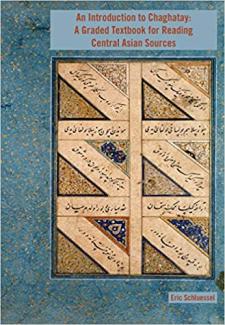
An Introduction to Chaghatay: A Graded Textbook for Reading Central Asian Sources — Eric Schluessel
A textbook designed by GWU professor Eric Schluessel for those learning to reading Chagatay, the premodern literary Turkic language of Central Asia, closely related to Uzbek and Uighur. This creative commons textbook includes grammar explanations, reading exercises, paleographic notes, and a useful Chagatay-English glossary.
Online Courses and Resources
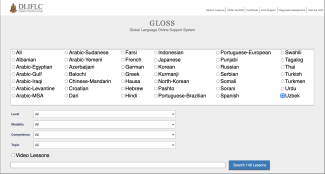
A service of the Defense Language Institute Foreign Language Center, the Global Language Online Support System offers 149 Uzbek lessons at 3 different levels, with an emphasis on listening comprehension and news reading.
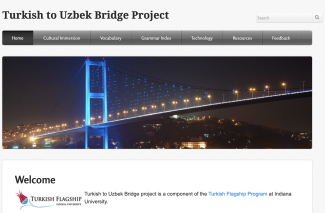
Turkish to Uzbek Bridge Project — Umida Khikmatillaeva
This website and the accompanying course was designed by Umida Khikmatillaeva to help learners of Uzbek with any background in Turkish quickly transition their existing knowledge of Turkish grammar and vocabulary to the Uzbek context.
